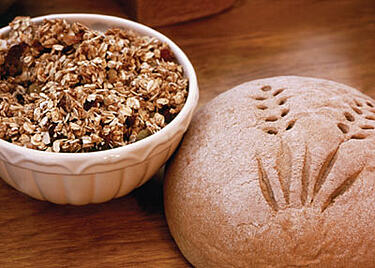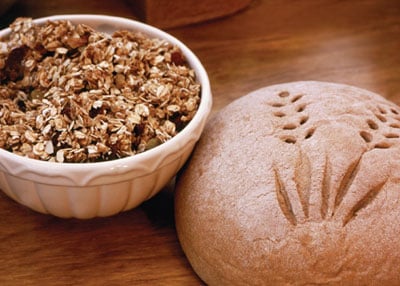Overall, it must be kept in mind that no single nutrient or food item is to blame for anyone’s belly. A positive energy balance, meaning you are taking in more calories than you burn, is the cause for weight gain, not certain types of food. As such, a surplus of calories from specific foods, such as carbohydrates or wheat, does not promote body fat any differently than excess calories from other food types.
 Making the claim that eating a slice of whole wheat bread is bad for you or is to blame for the obesity epidemic denies the fact that whole grain wheat provides highly beneficial phytochemicals, vitamins, minerals, and fiber. In fact, a study published in 2009 in the Journal of the American Dietetic Association found that consuming a low-carbohydrate diet was associated with an increased likelihood of being overweight or obese. The lowest risk was found with those who consumed about 47%-67% of their calories from carbohydrates.
Making the claim that eating a slice of whole wheat bread is bad for you or is to blame for the obesity epidemic denies the fact that whole grain wheat provides highly beneficial phytochemicals, vitamins, minerals, and fiber. In fact, a study published in 2009 in the Journal of the American Dietetic Association found that consuming a low-carbohydrate diet was associated with an increased likelihood of being overweight or obese. The lowest risk was found with those who consumed about 47%-67% of their calories from carbohydrates.
Studies are consistently finding body fat percentages, especially in the abdominal region, are strongly inversely correlated with whole grain intake. What’s even more interesting is that a study published in The Journal of Nutrition found that fiber from whole grain cereals  was linked to greater reductions in body fat percentage and lower abdominal fat as compared to not only refined grains, but also total fiber intake. This suggests that fiber from whole grains may be more effective than fiber from other sources in reducing body fat percentage, particularly for the abdominal region. This tells us that whole grains may have an effect on where body fat is distributed. Keeping your waist trim not only improves your bikini wearing ability, but is also related to a reduced risk of Type 2 Diabetes and cardiovascular disease which are two major chronic diseases affecting many Americans today.
was linked to greater reductions in body fat percentage and lower abdominal fat as compared to not only refined grains, but also total fiber intake. This suggests that fiber from whole grains may be more effective than fiber from other sources in reducing body fat percentage, particularly for the abdominal region. This tells us that whole grains may have an effect on where body fat is distributed. Keeping your waist trim not only improves your bikini wearing ability, but is also related to a reduced risk of Type 2 Diabetes and cardiovascular disease which are two major chronic diseases affecting many Americans today.
If you like to follow a diet book, stick with diets that are scientifically proven to not only slim you down, but keep you nourished and healthy. Check out one titled The Whole Grain Diet Miracle written by Lisa Hark, PhD, RD and Darwin Deen, MD. This book was evaluated by the Academy of Nutrition and Dietetics and stated as having “well balanced meal plans that are nutritious and may introduce you to new healthful, flavorful foods with its fifty interesting and creative recipes.” Avoid diet books and recommendations that eliminate entire food groups. Although these diets may induce weight loss, they also cause deficiencies and are difficult to maintain. As a result, you may regain the weight down the road.
Miracle written by Lisa Hark, PhD, RD and Darwin Deen, MD. This book was evaluated by the Academy of Nutrition and Dietetics and stated as having “well balanced meal plans that are nutritious and may introduce you to new healthful, flavorful foods with its fifty interesting and creative recipes.” Avoid diet books and recommendations that eliminate entire food groups. Although these diets may induce weight loss, they also cause deficiencies and are difficult to maintain. As a result, you may regain the weight down the road.
Also don’t forget all of the health benefits, nutrients, and positive statistics associated with whole grains, including whole grain wheat flour:
The benefits of whole grains most documented by repeated studies include:
- stroke risk reduced 30-36%
- type 2 diabetes risk reduced 21-30%
- heart disease risk reduced 25-28%
- better weight maintenance
Other benefits indicated by recent studies include:
- reduced risk of asthma
- healthier carotid arteries
- reduction of inflammatory disease risk
- lower risk of colorectal cancer
- healthier blood pressure levels
- less gum disease and tooth loss
How do you like to incorporate grains into your diet?
References:
McKeown N, Troy L, Jacques P, Hoffmann U, O’Donnell C, Fox C. Whole and refined grain intakes are differentially associated with abdominal visceral and subcutaneous adiposity in healthy adult: the Framingham Heart Study. Am J Clin Nutr 2010; 92:1165-1171.
McKeown N, Yoshida M, Shea M, Jacques P, Lichtenstein A, Rogers G, Booth S, Saltzman E. Whole Grain Intake and Cereal Fiber Are Associated with Lower Abdominal Adiposity in Older Adults. J. Nutr. 2009; 139: 1950-1955.
Anwar M, Vatanparast H, Barlas S, Dehghan M, Shah S, Koning L, Steck S. Carbohydrate Intake and Overweight and Obesity among Healthy Adults. J Am Diet Assoc. 2009; 109:1165-1172.
Whole Grains 101: What are the Health Benefits? Oldways Preservation Trust/Whole Grains Council. Accessed 07/2012.




